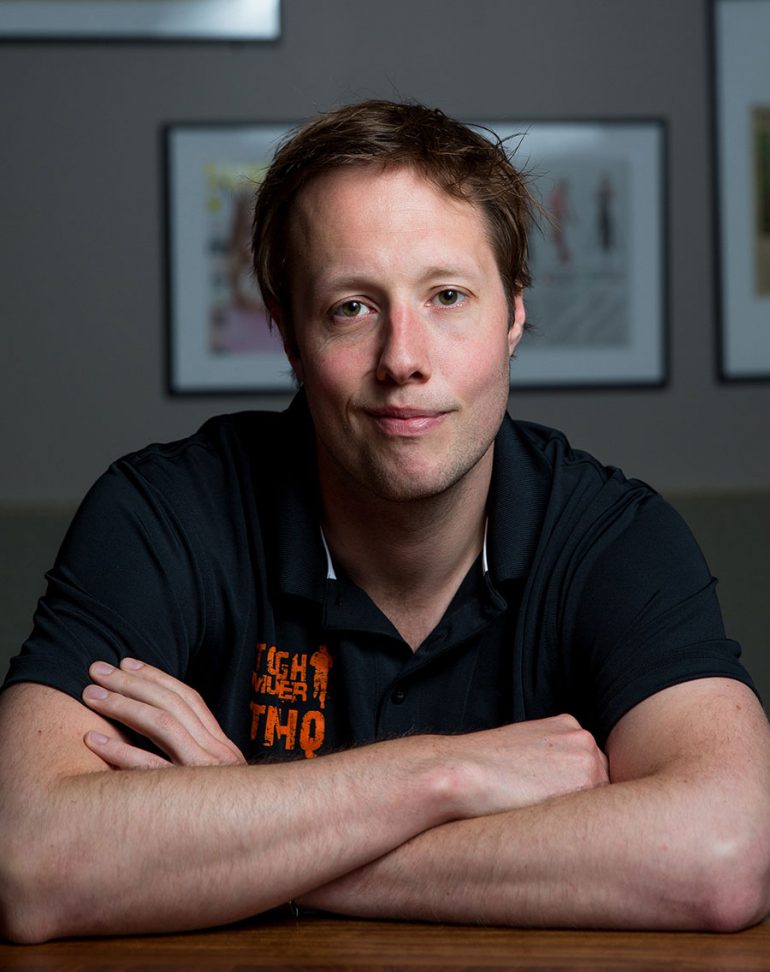Behind every brand delivering a great experience is a leader who recognizes the value of keeping things simple. In Simplifiers, Margaret Molloy, our Global CMO, interviews business leaders who put simplicity to work.
In this Simplifiers interview, Margaret speaks with Will Dean, Founder & CEO, Tough Mudder.
MM: What does Tough Mudder stand for and how does it deliver on that promise every day?
The mission of Tough Mudder is to grow a global tribe that harnesses the power of teamwork and camaraderie.
We create obstacle course events designed to make people work as a team. To this end, we have everyone recite a pledge on the start line that says they understand that Tough Mudder is not a race, it’s a challenge, for which teamwork and camaraderie are necessary.
Everything we do, our events and our content, are about celebrating the simple idea that in life, what we achieve is nearly always a group effort. For example, I founded Tough Mudder, but I didn’t build it on my own.
MM: What role does simplicity play in delivering on that promise?
Simplicity is important from a marketing and a strategy perspective. The truth is, simplicity is necessary because both your customers and employees are busy. To effectively engage with you, they need a clear understanding of what you do and why you do it.
MM: How does Tough Mudder create simple experiences?
At its core, Tough Mudder is simple. It’s a 10-mile obstacle course. Whether you’ve done one in Germany or Australia, it’s the same experience, which means that you share something with others who have been through a Tough Mudder. If I go running in my Tough Mudder t-shirt in the park in London, and see another Tough Mudder t-shirt coming my way, it’s natural to hi-five that person because you both know that you have a shared experience.
MM: What do you believe to be the benefit of having simplicity at the core of your brand?
The benefits are multiple. First and foremost, as your company becomes larger, you have to try to do one or two things extremely well. Understanding what those are is really important. The second point is that managers should know on an intuitive level what’s most important for the business. What is really the alternative to simplicity? The alternative is chaos. Simplicity is not a choice, it’s a necessity.
MM: What are you doing to help keep things simple as you grow?
Fundamentally, Tough Mudder does three things: it produces live events, creates content about these events and prepares people for these events with its training business. It’s important that everything the company does is in some way related to one of these activities. Every person at Tough Mudder should understand how they’re helping to drive those three things.
MM: How do you lead as a simplifier?
Simplifying is a process. When simplifying, you have to get to the essence of an issue without leaving something fundamental on the cutting room floor. Each day, I spend an hour or two thinking about what’s going on across the company, what our priorities are, what opportunities are available to us, and how these all link to the goals and objectives of the company. It’s important to simplify as much as possible, but a key component to simplicity is knowing when to stop.
MM: I see you earned an MBA. Do you think that business school graduates, as a population, are simplifiers?
At business school, you’re often rewarded for making the brilliant comment. Sometimes that’s a simplifying comment, which brings a bunch of different points together in a precise fashion. And sometimes it’s the exact opposite.
Business school can sometimes encourage being overly reductive because general managers often have to be. The danger is giving the impression that there’s only one thing you need to be concerned about. To get to simplification, you have to embrace complexity—that factor coming out of left field might be important. You can only simplify once you’re confident that you’ve been comprehensive.
MM: What’s a recent simple customer experience that inspired you?
Norwegian Air makes booking flights extremely easy. They don’t play games with their customers—it’s clear what they offer and what you’re going to get. I’m always amazed by how much some airlines can upset you by charging an extra three pounds for something trivial. It feels like they’re being disrespectful to your intellectual bandwidth, as well as your wallet.
MM: What’s the biggest mistake brands make when trying to simplify?
The desire for simplicity sometimes leads people to cut out things that are quite fundamental. When they do that, they lose focus and end up with something meaningless that fails to capture what you’re about. When you simplify too much, you run the risk of people seeing your business as disingenuous, which creates cynicism.
MM: What’s an example of a difficult decision you made for the sake of simplicity?
We launched a brand called Mudderella, which was a women-only Tough Mudder. It was quite successful. But it became clear that, considering the stage Tough Mudder was in at the time, it was premature for us to operate as more than one brand. So even though Mudderella was successful, we ended it.
MM: How would you define simplicity?
Arriving at the essence of an issue.
MM: What’s the top piece of advice you’d give to brands trying to simplify?
Recognize that the quest for simplicity is a journey. Life is complicated, and the world is constantly changing. Simplicity is important to aim for and impossible to arrive at.
MM: Why is simplicity so important for marketing specifically?
Once you start speaking one to many, there’s a fundamental law that the capacity of a crowd to absorb information in a rational and thoughtful manner is actually less than the capacity of the individuals in that crowd. Simplicity isn’t a choice, it’s a necessity to scale marketing.
MM: Thank you
This is an ongoing Simplifiers series. See interviews with CMO at Deloitte, Diana O’Brien; CMO at Georgia-Pacific, Douwe Bergsma; CMO at Lenovo, David Roman; EVP – Chief Marketing and Communications Officer at Hewlett Packard Enterprise, Henry Gomez; CMO at Twitter, Leslie Berland; CMO at Blue Apron, Jared Cluff; SVP, Global Brand Management at American Express, Clayton Ruebensaal; EVP and Group President at Verizon Wireless, Ronan Dunne, Director of Strategy and Innovation at Cofra Holding Ltd, former CEO of C&A China, Lawrence Brenninkmeyer; CMO at The Recording Academy, Evan Greene; CMO at Mary Kay, Sheryl Adkins-Green; Head of Marketing at Home Centre, Rohit Singh Bhatia; SVP, CMO of Aflac, Gail Galuppo; SVP and CMO at Cambia Health Solutions, Carol Kruse, Managing Director of The Nature Conservancy, Geof Rochester, Chief Strategy and Innovation Officer of Motorola Solutions, Eduardo Conrado, EVP; SVP, Chief Marketing & External Affairs Officer at Abbott, Elaine Leavenworth, GE CMO, Linda Boff; McLaren Automotive Head of Brand Marketing, Stephen Lambert; Ascension Chief Marketing and Communications Officer, Nick Ragone; Hertz CMO, Matt Jauchius; Direct Line Group Marketing Director, Mark Evans; McDonald’s CMO, Deborah Wahl; Jet.com President, Liza Landsman and VP Marketing, Sumaiya Balbale; Target CMO, Jeff Jones; Spotify CMO, Seth Farbman; Ally Financial CMO, Andrea Riley; Gannett CMO, Andy Yost; CVS Health CMO, Norman De Greve; Dunkin’ Brands CMO, John Costello; Zappos CEO, Tony Hsieh; Southwest Airlines CMO, Kevin Krone; and Google CMO, Lorraine Twohill.
Know a simplifier or would like to be included in the series? Please recommend an executive for my next interview: [email protected]
Margaret Molloy is Global CMO and head of business development at Siegel+Gale. Follow her on Twitter: @MargaretMolloy


